Dear Zazie, Here is today’s Lovers’ Chronicle from Mac Tag dedicated to his muse. Follow us on twitter @cowboycoleridge. What would you do for love? What have you done for love? Rhett
The Lovers’ Chronicle
Dear Muse,
© copyright 2021 mac tag/cowboy coleridge all rights reserved
per amore,
hai mai speso
tutto quanto,
once ago
under the warm
carolina sun…
“So look forward to your notes.”
so enjoy sendin’ ’em
“Seem to be craving your touch.”
workin’ on another for you
“I will be here ever patiently
awaiting your return.”
“The paths we travel,
to find, and keep, happiness.”
tellin’ things never told
“We did not want to stop ourselves.”
“You inspired me to start
reading again; starting
with Lady Chatterly’s Lover.”
excellent choice
i am readin’ Nin, again
she reminds me of you,
smart and beautiful
“Your honest creativity,
your self expression,
never cease to amaze.
You are brave.”
well, trust is all
you know your thoughts
are safe with me
“In all things
I feel safe with you.”
remember how this all started…
woman appears
no other place
but there to be
no other afternoon
but that one
full woman
so alive
years ago tryin’
to imagine
just such a woman
never seen until then
yet known long ago
your smile, your eyes
that laugh washin’
over in waves
carryin’ away grief
the courage
sensual
preoccupied by feelin’s
in response to you,
to be with you
to know again
carry completely,
the part of me
reflected in you
different all over
dreamin’
seein’ in you
wantin’ to be
tremblin’ unsureness,
enhancin’ all given to you
surrender pride and reason
to share
the same fantasies,
the same madness
© copyright 2019 mac tag/cowboy coleridge all rights reserved
“Have you forgotten?”
no of course not
my feelin’s are not dead
just buried deep
i know what it takes
i know what it was like
i remember
all of it
the tender touch
the shared dreams,
shared visions
that feelin’ of bein’
half of a whole
“Don’t you miss it?”
oh, hell yes
but missin’ and wishin’
ain’t gonna make it happen
“So what are you
going to do?”
all i can do,
keep on livin’
in this, voices from the past,
verse centered, light chasin’ vision
someone will come along
and want to join it, or not
all i can do
© copyright 2018 mac tag/cowboy coleridge all rights reserved
This poem was inspired by our letters and the writin’s of the French-Cuban author Anaïs Nin
Per Amore
Per amore, hai mai speso tutto quanto,
La ragione, il tuo orgoglio fino al pianto
For love, have you ever spent everything,
Reason, your pride, up to the tears
Once ago
Under the warm
Carolina sun…
“So look forward to your notes”
So enjoy sendin’ you notes
“Seem to be craving your touch”
Jottin’ notes on what will become,
A new poem dedicated to you
“Shall be here ever patiently”
Awaitin’ your return
“The paths we travel,
To find, and keep, happiness”
Tellin’ things never told
(We did not want to stop ourselves…)
“You inspired me to start
Reading again; starting
With Lady Chatterly’s Lover”
Excellent choice
I am readin’ Nin, again
She reminds me of you,
Smart and beautiful
“Your honest creativity,
Your self expression,
Never cease to amaze
You are brave”
Well, trust is all
You know your thoughts
are safe with me
“In all things
I feel safe with you”
Remember how this all started…
Woman walks in from the darkness
No other place in the world
But there to be
No other afternoon
But that one
Full woman
So alive
Years ago tryin’
To imagine such beauty
Creatin’ an image
Of just such a woman
Never seen until then
Yet known long ago
Your smile, your eyes
That smile, that laugh
Beauty washin’ over in waves
Carryin’ away grief, bringin’ peace
Anything asked would be done
By the end of that afternoon,
No extrication
From such an admiration
The courage of personality,
Sensual, heavy with nuance
Preoccupied in whirlpools
Of feelin’s in response to you,
Seekin’ whatever you wanted
And now, graspin’ the core of you
Wantin’ to run out and tell
Of your beauty, to shout
To the Carolina sky
To be without you
To never know again who I am,
What I am, what I love, what I want
You stirred me
You carry completely, always
The part of me reflected in you
Beauty struck me, dissolved me
Deep down, I am different all over
Dreamed you, wished for your existence
You are the one I have always wanted
Seein’ in you that part of me which is you
Wantin’ to be the best me that can be
Feelin’ compassion
For your tremblin’ unsureness,
Enhancin’ of all given to you
Surrender pride and reason
To be with you is to share
The same fantasies,
The same madness
The same for love
© copyright 2013 mac tag/Cowboy Coleridge
The Song of the Day is “Per Amore” by Andrea Bocelli. Disclaimer: we do not own the rights to this song. No copyright infringement intended.
| Molière | |
|---|---|

Portrait of Molière by Pierre Mignard (ca. 1658)
|

Today is the birthday of Jean-Baptiste Poquelin, known by his stage name Molière (Paris; 15 January 1622 – 17 February 1673 Paris); playwright and actor who is considered to be one of the greatest masters of comedy in Western literature. Among Molière’s best known works are The Misanthrope, The School for Wives, Tartuffe, The Miser, The Imaginary Invalid, and The Bourgeois Gentleman.
Molière’s hard work in so many theatrical capacities took its toll on his health and, by 1667, he was forced to take a break from the stage. In 1673, during a production of his final play, The Imaginary Invalid, Molière, who suffered from pulmonary tuberculosis, was seized by a coughing fit and a haemorrhage while playing the hypochondriac Argan. He finished the performance but collapsed again and died a few hours later.
Verse
Tartuffe (1664)
- Couvrez ce sein que je ne saurais voir.
Par de pareils objets les âmes sont blessées.- Cover that bosom that I must not see:
Souls are wounded by such things. - Act III, sc. ii.
- Cover that bosom that I must not see:
- Le scandale du monde est ce qui fait l’offense,
Et ce n’est pas pécher que pécher en silence.- To create a public scandal is what’s wicked;
To sin in private is not a sin. - Act IV, sc. v.
- To create a public scandal is what’s wicked;
Le Misanthrope (1666)
- Sur quelque préférence une estime se fonde,
Et c’est n’estimer rien qu’estimer tout le monde.- On some preference esteem is based;
To esteem everything is to esteem nothing. - Act I, sc. i.
- On some preference esteem is based;
- Et c’est une folie, à nulle autre, seconde,
De vouloir se mêler de corriger le monde.- The world will not reform for all your meddling.
- As published in Le Misanthrope, Molière, tr. Curtis Hidden Page, G.P. Putnam’s Sons (1913), p. 12
- Variant translation: Of all follies there is none greater than wanting to make the world a better place.
- As contained in The Columbia Dictionary of Quotations, ed. Robert Andrews, Columbia University Press (1993), p.772 : ISBN 0231071949
- Act I, sc. 1, lines 155-156 (Philinte)
- The world will not reform for all your meddling.
- C’est un parleur étrange, et qui trouve toujours
L’art de ne vous rien dire avec de grands discours.- He’s a wonderful talker, who has the art
Of telling you nothing in a great harangue. - Act II, sc. iv.
- He’s a wonderful talker, who has the art
- Que de son cuisinier il s’est fait un mérite,
Et que c’est à sa table à qui l’on rend visite.- He makes his cook his merit,
And the world visits his dinners and not him. - Act II, sc. iv.
- He makes his cook his merit,
- On voit qu’il se travaille à dire de bons mots.
- You see him laboring to produce bons mots.
- Act II, sc. iv.
- Plus on aime quelqu’un, moins il faut qu’on le flatte:
À rien pardonner le pur amour éclate.- The more we love our friends, the less we flatter them;
It is by excusing nothing that pure love shows itself. - Act II, sc. iv.
- The more we love our friends, the less we flatter them;
- Les doutes sont fâcheux plus que toute autre chose.
- Doubts are more cruel than the worst of truths.
- Act III, sc. v.
- On peut être honnête homme et faire mal des vers.
- Anyone may be an honorable man, and yet write verse badly.
- Act IV, sc. i.
- Si de probité tout était revêtu,
Si tous les cœurs était francs, justes et dociles,
La plupart des vertus nous seraient inutiles,
Puisqu’on en met l’usage à pouvoir sans ennui
Supporter dans nos droits l’injustice d’autrui.- If everyone were clothed with integrity,
If every heart were just, frank, kindly,
The other virtues would be well-nigh useless,
Since their chief purpose is to make us bear with patience
The injustice of our fellows. - Act V, sc. i.
- If everyone were clothed with integrity,
- C’est un merveilleux assaisonnement aux plaisirs qu’on goûte que la présence des gens qu’on aime.
- It is a wonderful seasoning of all enjoyments to think of those we love.
- Act V, sc. iv.
Amphitryon (1666)
- J’aime mieux un vice commode,
Qu’une fatigante vertu.- I prefer an accommodating vice
To an obstinate virtue. - Act I, sc. iv.
- I prefer an accommodating vice
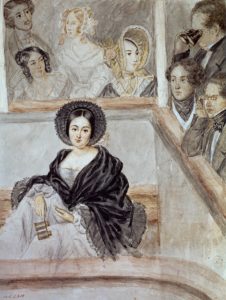
watercolor by Camille Roqueplan
Today is the birthday of Marie Duplessis (born Alphonsine Plessis; Normandy, 1824 – 3 February 1847); courtesan. She was beautiful: petite, dark-haired, and slim. She was working as a laundress at the age of 13 when her father decided that prostitution paid better. He sent her to live with a rich and elderly bachelor in exchange for cash. After a year she went to live with cousins in Paris. For a time she was kept by a restaurant owner who gave her a place to live in exchange for her favors. It was not long before she set her sights higher. She learned to read and write and she studied a wide variety of subjects so that she could hold her own in any social situation. She started appearing at places where the rich and powerful were likely to be and she attracted lots of attention.
She suspected she had tuberculosis when she developed a cough that only got worse. She was treated with everything from spa cures to strychnine to hypnotism. And through it all, she kept dressing up and holding salons and going to the opera. Having grown up in poverty, she could not get enough of luxury. Noblemen from all over Europe would call on her whenever they were in Paris and they brought her expensive trinkets which she sometimes pawned to support herself between lovers.
She began an affair with Alexandre Dumas the younger when they were both 20 years old. He was a struggling writer and he was not able to give her lavish gifts like her other lovers. He kept her with him out in the country for a while, for the sake of her health, but she missed the lively Paris scene and went back to the city after a year. Finally, he could not take it anymore, and broke it off with her, writing in a letter, “I am neither rich enough to love you as I could wish nor poor enough to be loved as you wish.”
Duplessis never answered Dumas’s letter. She was too ill, and she had begun an affair with the composer and pianist Franz Liszt. She wanted Liszt to bring her along on his concert tour, but he was afraid he would catch tuberculosis from her, so he left her behind. He promised to take her to Turkey one day, but he never saw her again. After she died at the age of 23, Liszt regretted not coming to her bedside, and said: “She had a great deal of heart, a great liveliness of spirit and I consider her unique of her kind. […] She was the most complete incarnation of womankind that has ever existed.”
Four months after Duplessis’s death Dumas published his novel The Lady of the Camellias (1848). It is the story of a courtesan named Marguerite Gautier, based on Duplessis. She breaks the heart of her lover — Armand Duval — to spare him from ruin. Dumas wrote it in four weeks. It was later made into a play, which in turn inspired Verdi’s opera La Traviata (1853).
| Giovanni Segantini | |
|---|---|
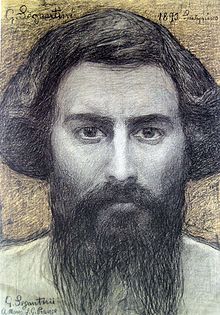
Self-portrait, 1895
|
|
Today is the birthday of Giovanni Segantini (Arco, Trentino, Austrian Empire 15 January 1858 – 28 September 1899 Pontresina, Graubünden, Switzerland); painter known for his large pastoral landscapes of the Alps. He was one of the most famous artists in Europe in the late 19th century, and his paintings were collected by major museums. In later life he combined a Divisionist painting style with Symbolist images of nature.
In 1879 he met Luigia Pierina Bugatti (1862–1938), known as “Bice”, and they began a life-long romance. Although Segantini tried to marry Bice the next year, due to his stateless status he could not be granted the proper legal papers. In opposition to this bureaucratic technicality, they decided to live together as an unmarried couple. This arrangement led to frequent conflicts with the Catholic church that dominated the region at this time, and they were forced to relocate every few years to avoid local condemnation.
In spite of these difficulties, Segantini was devoted to Bice throughout his life. He wrote many love letters when he was away from her, sometime including wild flowers that he had picked. Once he wrote “Take these unsightly flowers, these violets, as a symbol of my great love, When a spring comes in which I fail to send you such violets, you will no longer find me among the living.”
In 1880 he and Bice moved to Pusiano and soon thereafter to the village of Carella. It was in this mountain scenery that Segantini began to paint en plein air, preferring to work in the outdoors than in a studio.
Eager to finish the third part of his large tryptich, Nature (Segantini Museum, St. Moritz) Segantini returned to the high altitude of the mountains near Schafberg. The pace of his work, coupled with the high altitude, affected his health, and in mid-September he became ill with acute peritonitis. Two weeks later he died. His son Mario and his partner Bice were with him at his death bed.
Gallery
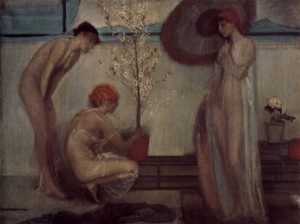
L’ange de la vie


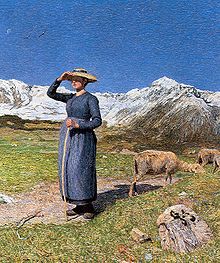

-

Bagpipers of Brianza, 1883-1885.
-

Ave Maria on the Lake, 1886
-

Il lavoratore della terra, 1886 (charcoal
-

Return from the Woods, 1890
-

Alpine landscape, 1893-94
-

Love at the Fountain of Life, 1896.
-

Vanitas, 1897
-

Alpine Triptych: Life, 1898-99
-
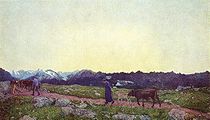
Alpine Triptych: Nature, 1898-99
-

Alpine Triptych: Death, 1898-99
-

Segantinihütte (Death place of Giovanni Segantini) on top of the grassy summit
Mac Tag

No Comments on "The Lovers’ Chronicle 15 January – vision – verse by Molière – birth of Marie Duplessis – art by Giovanni Segantini"